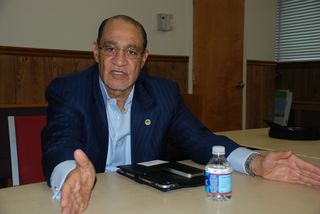 Fifty years ago the United States declared war on poverty. Half a century and trillions of dollars later, what’s been accomplished? Is it an incomplete triumph or a wasteful failure?
Fifty years ago the United States declared war on poverty. Half a century and trillions of dollars later, what’s been accomplished? Is it an incomplete triumph or a wasteful failure?
What really captured my thought was the slogan itself — “The War on Poverty.” I’m not sure there ever really was a war on poverty. It’s a great expression. And years later, it is an incomplete triumph, not a waste, but it is an incomplete triumph.
I don’t think the resources have really been put into the whole massive problem of poverty. When a country really goes to war, the resources are almost limitless to accomplish the goal and to win. And that is not the case when it comes to poverty. Our budgets are limited. If you look back, 15 trillion dollars over 50 years is not that much money. Not really. And there are a whole lot of other resources that could have been brought to bear.
Poverty in America continues to have a disproportionate impact on some racial groups. Why is this so? What does that say about the state of racial relations in America today?
Basically from my vantage point, moving across America and from observation and engagement in many social justice issues and discussions, race is at the core of so much of what goes on in America, and poverty is one of these issues. Race is always the forbidden topic. We don’t talk about it. It is always pushed back. Until we really sit down in America and have some major discussions about race — how we see each other, how we see culture, how we understand and communicate — there will always be a problem of how to deal with poverty.
I recently heard a couple of businessmen on CNN talking about poverty and they said, “Poverty is not about economics. It’s about simply three things: poor schools, poor neighborhoods and single parent homes. That’s it, period.” To me that is coded language that is not factual. Because if you really have a major conversation about that, then you ask, Why are the schools poor schools? Why is it that the funding isn’t there? Why is it that the teachers aren’t there? What is it that’s driving the direction of single parent homes?
Then you have to talk about mass incarceration. You have to talk about the injustice of the justice system that creates a lot of this. We do not want to have those conversations because race is part of the discussion.
What message would you give to churches which are not passionate about addressing poverty or which are uncertain about how they can effectively engage the issue?
I’ve noticed in the last 10 to 20 years more churches stay away from all issues that affect the bottom line. It could be poverty, it could be voter suppression, whatever it is that upsets the budgets coming in. But when it comes to this issue, we are charged by Matthew 25 to be concerned with our neighbor and how we treat others, because that is how we are treating Jesus and how we are living out our Christianity. And so we have a responsibility to speak out. We cannot say that we are living the Christian life if we do not address the issue of poverty itself.
What aspects of evangelical theology need to be adapted before evangelical churches can become more deeply involved in poverty issues?
We just need to be the church. The church needs to be the church.
This article originally appeared in Herald, our bi-monthly magazine. To find out more about the magazine, click here.
See related stories:
‘War on poverty’ remains incomplete after half century, say advocates
